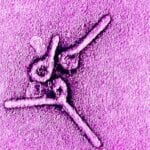 Researchers from National Institute of Allergy and Infectious Diseases (NIAID) and Thomas Jefferson University have developed a vaccine based on the established rabies virus vaccine that, when tested in mice, proved safe and provided protection against both rabies and the deadly Ebola infection.
Researchers from National Institute of Allergy and Infectious Diseases (NIAID) and Thomas Jefferson University have developed a vaccine based on the established rabies virus vaccine that, when tested in mice, proved safe and provided protection against both rabies and the deadly Ebola infection.
The researchers tested three different types of the novel rabies/Ebola vaccine in nonhuman primates to determine their protective effect, including a replication-competent rabies virus vaccine, a replication-deficient rabies virus vaccine and a chemically inactivated rabies virus vaccine expressing Ebola glycoprotein.
Fifteen rhesus macaques, divided into four groups, were immunized intramuscularly with one of the three vaccines or a control vaccine. All of the animals were followed for both rabies and Ebola-specific immune responses. After 42 days, all of the nonhuman primates were transferred to NIAID’s biosafety level-4 facility at Rocky Mountain Laboratories in Hamilton, Mont., for challenge with the Ebola virus.
All three vaccines produced potent immune responses against both rabies and Ebola. In terms of protection, the live replication-competent vaccines provided 100 percent protection following challenge with the Ebola virus. The replication-deficient and inactivated vaccines afforded 50 percent protection. According to the researchers, the protection of the immunized animals against Ebola virus infection was largely dependent on the quality of the B-cell driven immune response rather than the quantity of the response. These humoral immune responses as well as high glycoprotein-specific antibodies were particularly helpful in controlling Ebola virus infection after immunization, the researchers wrote.
The results of these studies further support the concept that a successful Ebola vaccine needs to induce strong antibodies to the virus, according to the researchers. It also demonstrates that a dual-purpose vaccine to protect against rabies and Ebola virus is possible and, perhaps, more readily marketable. The research team is pursuing the inactivated rabies/Ebola vaccine for use in humans. The live vaccine is being developed for use in protecting wildlife at risk of Ebola virus infection in Africa, which could also serve to prevent transmission into the human population.
According to the researchers, advance testing among nonhuman primates involving higher levels of Ebola virus glycoprotein and, perhaps, an additional immunization dose could bring the protection rate to 100 percent. In addition, the research team is using the vaccine platform to develop a multivalent filovirus vaccine and other vaccine candidates against high consequence pathogens.
Read the study at PLoS Pathogens: Antibody quality and protection from lethal ebola virus challenge in nonhuman primates immunized with rabies virus based bivalent vaccine.
Source: NIAID


